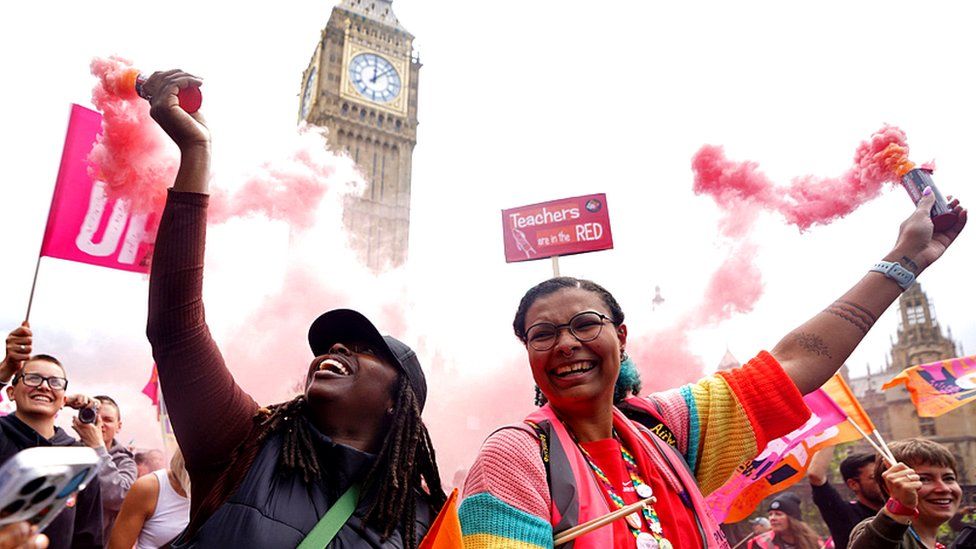
By Sean Seddon & Alice Evans
BBC News
How much to pay teachers is a “very difficult choice”, a minister has said, as strikes hit schools in England for the second time this week.
Robert Halfon said the government wanted to be fair to teaching staff but also “fair to the taxpayer”.
Many schools are expected to be closed or part-closed as National Education Union (NEU) members strike over pay.
The union said whether strikes should continue in the autumn term was “in the government’s hands”.
Friday’s walkout is the seventh national strike day since February, but it is the eighth day that most schools in England have been affected by strikes, because of regional action.
Teachers also walked out on Wednesday.
Figures on school closures caused by this week’s strikes have not been yet published, but more schools than ever were affected during the most recent action, in May.
A spokesperson for the Department for Education said Friday’s strike would lead to end-of-term events being cancelled, including Year 6 pupils’ secondary school transition days.
Next year’s pay is being considered by the government after a report was submitted by the independent pay review body.
That body has reportedly recommended a 6.5% rise for teachers, and education unions have accused the government of sitting on the report.
Mr Halfon told BBC Breakfast he had not seen the final report and could not confirm that 6.5% had been recommended.
He said the government “has a very difficult choice” to make, saying decisions about teachers’ pay should be balanced against the fact the government has “got to spend billions of pounds helping people with the cost of living”.
“We’ve got to be as fair as possible to teachers and support staff, who work incredibly hard… but we also have to be fair to the taxpayer,” he said.
He said the government would make a decision after the report was published.
Image source, PA Media
Education unions say teachers are struggling to make ends meet
Speaking to BBC Radio 4’s Today programme, the NEU’s joint-general secretary, Dr Mary Bousted, called the reported offer “credible”, saying it would be the “biggest award announced by a pay review body” and “deserved for teachers”.
She said: “I think members would accept 6.5% with one major addition, which is that it would be funded.
“Schools don’t have the money to pay teachers 6.5%. We calculate there would need to be 3% on average [extra] funding for schools in order to do that.”
Asked whether she feared the government could overrule the pay review body, Dr Bousted said: “Unfortunately I think that’s entirely possible. We hope that that’s not the case.”
The NEU is balloting for further strike action in the autumn, which could involve co-ordinated strikes with three other education unions.
Dr Bousted said autumn strike action would not happen if a fully-funded 6.5% rise was offered, saying it was “in the government’s hands”.
Most state school teachers in England had a 5% pay rise for the year 2022-23.
The NEU wants teachers to have an above-inflation pay increase, plus extra money to ensure any pay rises do not come from schools’ existing budgets.
After intensive talks, the government offered an additional one-off payment of £1,000. It also offered a rise for most teachers next year of 4.3%, with starting salaries reaching £30,000.
The Department for Education described it as a “fair and reasonable offer”, and said schools would receive an extra £2.3bn over the next two years.
All four unions involved in the dispute rejected the offer.
Almost 40,000 full-time working-age teachers left the profession last year – the highest level since records began in 2010 – according to government data released last month.
However, overall the number of teachers has increased by 2,800 to 468,400, because more teachers have entered the profession.
Are you a teacher with a view on the strike? Are you a parent affected? You can share your experiences by emailing haveyoursay@bbc.co.uk.
Please include a contact number if you are willing to speak to a BBC journalist. You can also get in touch in the following ways:
If you are reading this page and can’t see the form you will need to visit the mobile version of the BBC website to submit your question or comment or you can email us at HaveYourSay@bbc.co.uk. Please include your name, age and location with any submission.








